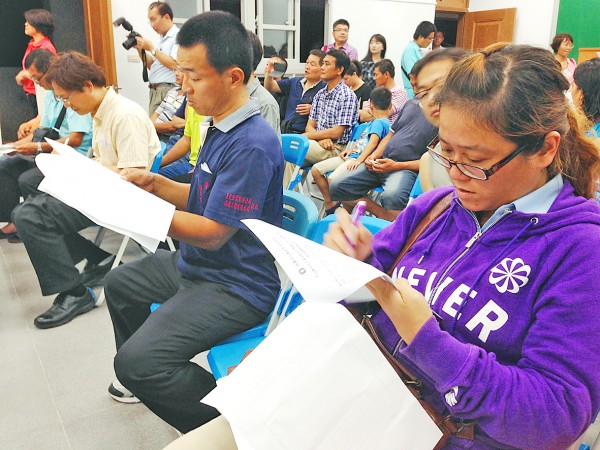《TAIPEI TIMES 焦點》 NHRI under fire over cancer-risk study

Parents read information provided by the National Health Research Institutes at the Syucuo branch of Ciaotou Elementary School in Mailiao on Wednesday. Photo: CNA
STUDENT SAFETY: The institute faced criticism for its position on research that suggested students near the No. 6 Naphtha Cracker faced higher risks for cancer
By Alison Hsiao / Staff reporter
Officials, academics and industry representatives gathered in Taipei yesterday to debate a National Health Research Institutes (NHRI) study that found students near the No. 6 Naphtha Cracker have a higher risk of developing cancer due to chronic exposure to vinyl chloride monomer (VCM).
Amid doubts about whether the research was scientifically sound and claims that results were too preliminary for policymaking, the panel brought together many stakeholders in the issue, including government officials, NHRI researchers, medical and public health researchers and academics, residents from the affected area and representatives of Formosa Plastics Group (FPG, 台塑集團), which operates the cracker in Yunlin County’s Mailiao Township (麥寮).
The forum, led by Democratic Progressive Party Legislator Liu Chien-kuo (劉建國), came after National Taiwan University Institute of Occupational Medicine and Industrial Hygiene professor Chan Chang-chuan (詹長權), who participated in the NHRI-sponsored study, revealed its findings earlier this week.
Chan said the research, controlled for other factors that might affect a metabolic process called thiodiglycolic acid (TDGA) excretion, found that students at the Syucuo branch of Ciaotou Elementary School, which is less than a kilometer from the FPG cracker, had elevated levels of TDGA in their urine. TDGA is major metabolite of VCM, which is a proven carcinogen and a gas released after standard processing by the plant, Chan said.
The average measurement from schoolchildren at the Syucuo school — 192.08 micrograms of TDGA per gram of creatinine — was much higher than that from three other elementary schools farther away from the plant, Chan said.
More than one student was found to have a urine level exceeding 500 micrograms of TDGA per gram of creatinine, he added.
Chan’s revelation of the “primary result,” in the words of the NHRI, of the research to reporters and his interpretation of the data were challenged by some officials, academics and the plant’s operator.
NHRI researcher Wen Chi-pang (溫啟邦), who was not involved in the study, countered that there is “nowhere in the world” where a company would determine the VCM exposure of its workers by testing TDGA levels in their urine.
“There is an association between VCM and TDGA, but maybe it is not that salient [for TDGA as a biomarker],” Wen said.
Wen said it is misleading for media outlets to directly link TDGA levels with cancer risks.
“Overinterpretation should not be encouraged lest panic spread among the residents,” Wen said.
Several experts, as well as the FPG in its statement, questioned the validity of urinary TDGA levels as a biomarker for VCM exposure, and the lack of a control group or a group with background value.
Yunlin County Deputy Commissioner Shih Keh-he (施克和) said he was “confused” by the perceived contradiction shown by Chan and the NHRI’s interpretations of the research result.
What Shih was referring to was that while a NHRI researcher making a presentation during the discussion said that the health examination given to the schoolchildren showed no abnormalities, Chan interpreted elevated TDGA levels as signifying a serious risk to the children’s health.
Yunlin County Government Health Bureau head Wu Chao-chun (吳昭軍), who attended a meeting held by the NHRI for local residents on Wednesday night, said that while the Syucuo students’ average urinary TDGA level is exceptionally high, that by itself does not indicate a higher risk of cancer.
The NHRI was accused of downplaying the elevated numbers and the association between TDGA and VCM in the meeting with the residents, which met with strong criticism from at least one academic.
However, many academics agreed that while the soundness of the research could be improved and the study has a long way to go, for the children’s sake it would be appropriate for the government to take action and relocate the students before the final results arise, a conclusion with which Shih agreed.
新聞來源:TAIPEI TIMES




















